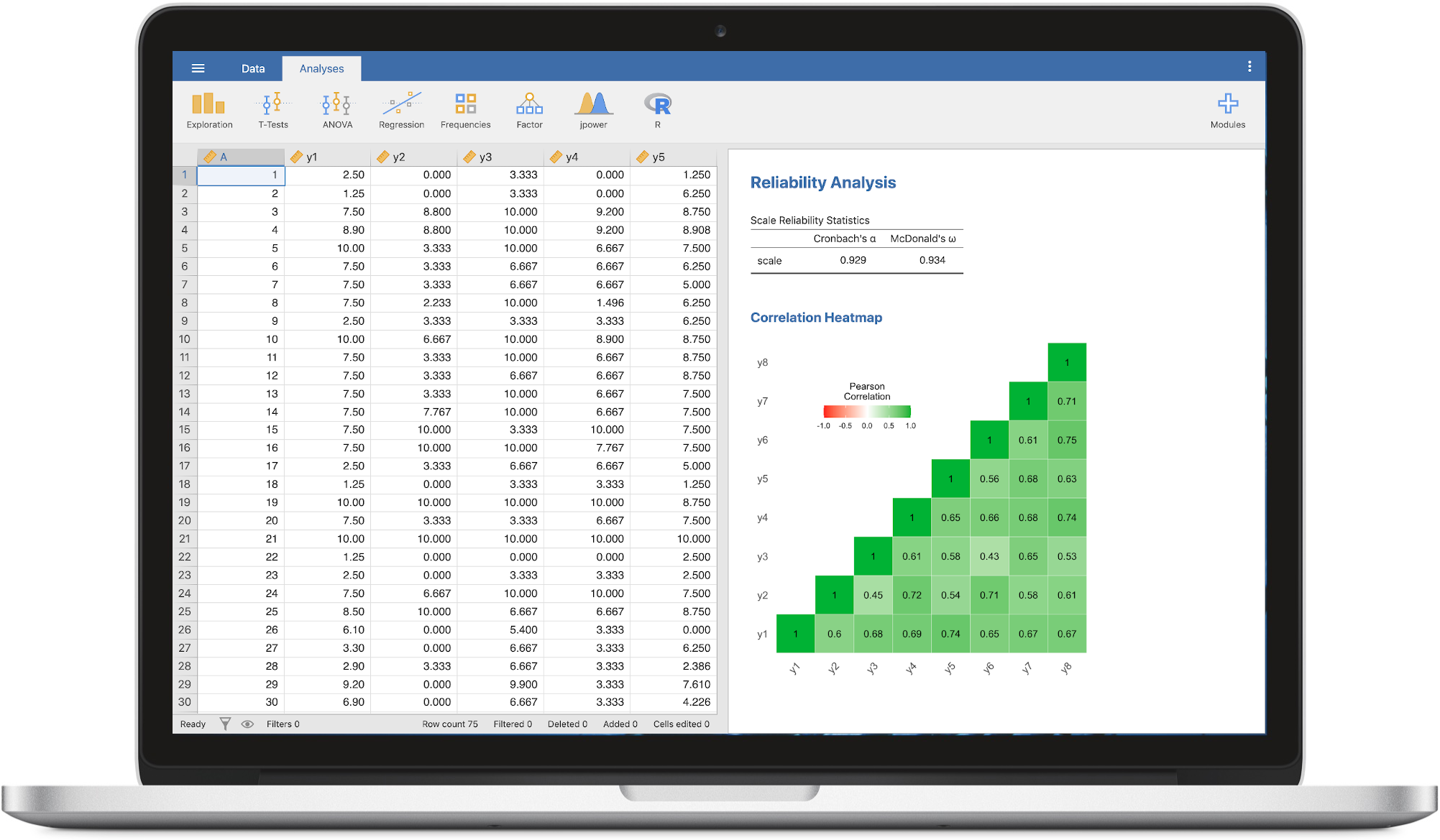OS X Yosemite is Apple's operating system for Mac. An elegant design that feels entirely fresh, yet inherently familiar. The apps you use every day, enhanced with new features. And a completely new relationship between your Mac and iOS devices. OS X Yosemite will change how you see your Mac. And what you can do with it. Redesigned interface. Download JASP Entirely for free, no strings attached. Windows Windows 64bit Windows 32bit The pre-installed 64-bit or 32-bit version can be used if the msi fails. Please note that JASP0.14 is not available for Windows 7. MacOS Catalina Mojave Continue reading →.
We divide up Mac statistics programs to make it easier for you to discover the one that’s right for you:
- Free software including SPSS clones (updated 12/17/2020)
- General statistics software from Acustat to Wizard (updated 1/6/2021)
- Graphing and data visualization (updated 1/6/2021)
- Data extraction (from scanned graphs)
Also see our webmaster’s videos on SPSS and PSPP
Mac issues


- Is it 64-bit, M1 safe, and signed by Apple?
- Also see “Stay safe: Malware prevention for Macs.”
Macintosh statistical software reviews
- SPSS • Stata • JMP • Wizard (see our guide to using SPSS)
- Free: JASP • PAST • Jamovi (More in-depth and helpful-tips coming soon)
- GraphPad Prism • StatPlus:Mac

Other stats packages and such
Terms of service and privacy policy
Macstats.org is provided subject to the following conditions; by visiting (in any manner), you accept these terms and conditions (the “Terms of Service”). Zatz LLC reserves the right to change the Terms of Service without notice.
Trademarks and copyrights. No portion of the information or documents on macstats.org may be reproduced in any form or by any means without the prior written permission of Zatz LLC. If you believe that your work has been used in a way that constitutes copyright infringement, please provide Zatz LLC with a description and identification of the copyrighted work(s) that you believe have been infringed, what URL or page title is infringing upon it, what you would like us to do, and suitable contact information. Contact us or send a fax to (201) 591-9837. Zatz LLC does not own the trademarks on this site, and is not affiliated with their owners.
Screwups and liability. All macstats.org content is provided “as is” — without warranty of any kind, either express or implied. Zatz LLC makes no warranty that the text and graphics will be timely, secure, or error-free. Zatz LLC assumes no responsibility for errors or omissions, inaccuracies, typographical errors, or any outdated materials and will not be liable for any special, punitive, incidental, indirect or consequential damages of any kind, including, without limitation, those resulting from loss of use or profits, on any theory of liability, arising out of or in connection with the use of these macstats.org or of any web site referenced or linked to from macstats.org. No advice or information obtained by you from Zatz LLC or macstats.org shall create any warranty.
Cookie/privacy policy. We may run advertisements provided by Google AdSense and others; they use cookies to provide and target these ads (this may be true before or after 2021). We also use Google Analytics for site improvement.
Last update in 2021. Proudly sponsored by Visual Data Tools.
Books by MacStats maintainer David Zatz• MacStats created in 1996 by Dr. Joel West; edited since 2005 by Dr. David Zatz of Toolpack Consulting. Copyright © 2005-2021 Zatz LLC. All rights reserved. Contact us.
The safest place to get apps for your Mac is the App Store. Apple reviews each app in the App Store before it’s accepted and signs it to ensure that it hasn’t been tampered with or altered. If there’s ever a problem with an app, Apple can quickly remove it from the store.
If you download and install apps from the internet or directly from a developer, macOS continues to protect your Mac. When you install Mac apps, plug-ins, and installer packages from outside the App Store, macOS checks the Developer ID signature to verify that the software is from an identified developer and that it has not been altered. By default, macOS Catalina and later also requires software to be notarized, so you can be confident that the software you run on your Mac doesn't contain known malware. Before opening downloaded software for the first time, macOS requests your approval to make sure you aren’t misled into running software you didn’t expect.
Running software that hasn’t been signed and notarized may expose your computer and personal information to malware that can harm your Mac or compromise your privacy.
View the app security settings on your Mac
By default, the security and privacy preferences of your Mac are set to allow apps from the App Store and identified developers. For additional security, you can chose to allow only apps from the App Store.
In System Preferences, click Security & Privacy, then click General. Click the lock and enter your password to make changes. Select App Store under the header “Allow apps downloaded from.”
Open a developer-signed or notarized app
Jasp Pour Mac En
If your Mac is set to allow apps from the App Store and identified developers, the first time that you launch a new app, your Mac asks if you’re sure you want to open it.
An app that has been notarized by Apple indicates that Apple checked it for malicious software and none was detected:
Prior to macOS Catalina, opening an app that hasn't been notarized shows a yellow warning icon and asks if you're sure you want to open it:
If you see a warning message and can’t install an app
If you have set your Mac to allow apps only from the App Store and you try to install an app from elsewhere, your Mac will say that the app can't be opened because it was not downloaded from the App Store.*
If your Mac is set to allow apps from the App Store and identified developers, and you try to install an app that isn’t signed by an identified developer and—in macOS Catalina and later—notarized by Apple, you also see a warning that the app cannot be opened.
If you see this warning, it means that the app was not notarized, and Apple could not scan the app for known malicious software.
You may want to look for an updated version of the app in the App Store or look for an alternative app.
If macOS detects a malicious app
If macOS detects that an app has malicious content, it will notify you when you try to open it and ask you to move it to the Trash.
How to open an app that hasn’t been notarized or is from an unidentified developer
Running software that hasn’t been signed and notarized may expose your computer and personal information to malware that can harm your Mac or compromise your privacy. If you’re certain that an app you want to install is from a trustworthy source and hasn’t been tampered with, you can temporarily override your Mac security settings to open it.
In macOS Catalina and macOS Mojave, when an app fails to install because it hasn’t been notarized or is from an unidentified developer, it will appear in System Preferences > Security & Privacy, under the General tab. Click Open Anyway to confirm your intent to open or install the app.
The warning prompt reappears, and you can click Open.*
The app is now saved as an exception to your security settings, and you can open it in the future by double-clicking it, just as you can any authorized app.
Privacy protections
macOS has been designed to keep users and their data safe while respecting their privacy.

Gatekeeper performs online checks to verify if an app contains known malware and whether the developer’s signing certificate is revoked. We have never combined data from these checks with information about Apple users or their devices. We do not use data from these checks to learn what individual users are launching or running on their devices.
Notarization checks if the app contains known malware using an encrypted connection that is resilient to server failures.

These security checks have never included the user’s Apple ID or the identity of their device. To further protect privacy, we have stopped logging IP addresses associated with Developer ID certificate checks, and we will ensure that any collected IP addresses are removed from logs.
In addition, over the the next year we will introduce several changes to our security checks:
Jasp Pour Machine
- A new encrypted protocol for Developer ID certificate revocation checks
- Strong protections against server failure
- A new preference for users to opt out of these security protections
Jasp Pour Mac Os
*If you're prompted to open Finder: control-click the app in Finder, choose Open from the menu, and then click Open in the dialog that appears. Enter your admin name and password to open the app.
